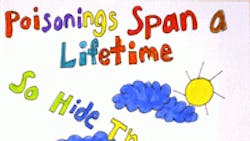The Poison Prevention Week Council reports that the nation's 57 poison control centers receive more than 2 million reported poisonings each year, and 90 percent of poisonings occur in the home. Poisonings are one of the leading causes of death among adults, and the majority of non-fatal poisonings occur in children under age six.
CDC adds that unintentional poisoning deaths in the United States increased 160 percent from 1999 to 2009, making the National Poison Prevention Week's message more important now than ever.
Poisoning Prevention
To be prepared, program the Poison Help Line into your phone – and, if possible, your memory: 1-800-222-1222. Calling this number will connect you with your local poison center to provide information, educational materials and assistance with a poisoning emergency. Emergency information is provided in 161 languages. Be sure to ask your family, friends and loved ones to keep this number close on hand, too.
Visit the Poison Help Web site. This national campaign, funded by the U.S. Department of Health and Human Services' Health Resources and Services Administration (HRSA), educates people on preventing poisoning and how to respond should a poisoning occur. The site offers resources for teachers, health professionals, parents and local businesses.
Poison Help also offers a variety of tips targeted to different age groups. For adults, the campaign recommends using caution with painkillers, sedatives and household cleaning products; to never mix household or chemical products together; be aware of the common poisons to avoid; to keep all chemicals, medicines and potentially poisonous substances out of the reach of children; and to educate children, teenagers and older adults on basic poison tips.
Remember, if you suspect someone has been poisoned, immediately call the Poison Help line at 1-800-222-1222. Do your best to remain calm – according to Poison Help, most poisoning emergencies can be resolved quickly. Finally, call 9-1-1 if the person is unconscious or is experiencing difficulty breathing.
Visit Poison Help or CDC's poison prevention page for additional tips and safety recommendations.
Congress established National Poison Prevention Week on Sept.16, 1961. The National Poison Prevention Week now is held the third week in March each year.
About the Author

Laura Walter
Laura Walter was formerly senior editor of EHS Today. She is a subject matter expert in EHS compliance and government issues and has covered a variety of topics relating to occupational safety and health. Her writing has earned awards from the American Society of Business Publication Editors (ASBPE), the Trade Association Business Publications International (TABPI) and APEX Awards for Publication Excellence. Her debut novel, Body of Stars (Dutton) was published in 2021.
